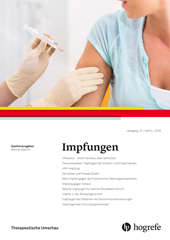Schaudern vor Impfzaudern?
Abstract
Zusammenfassung. Wachsendes Impfzaudern (vaccine hesitancy) könnte den Erfolg von Impfkampagnen zunehmend gefährden. Begünstigt wird die Ambivalenz bei Impfentscheidungen durch den Vertrauensverlust in die Impfungen und den Impfanbieter, die überfordernden Mengen an ungefilterten Informationen und das Dilemma zwischen dem individuellen Anspruch und der Solidarität gegenüber der Gemeinschaft. Die schwindenden Erfahrungen mit Krankheiten, welche durch Impfungen verhinderbar sind, führen als Kehrseite des Erfolgs von Impfungen zur veränderten Risikoperzeption zu Ungunsten der Impfung. Impfgegner machen nur eine kleine Minderheit in der Bevölkerung aus, deren Argumente werden aber überproportional durch Impfzauderer wahrgenommen. Nach wie vor sind Ärztinnen und Ärzte der Grundversorgung zentrale Figuren, wenn es um Gesundheitsfragen geht. Mit faktenbasierten Informationen und transparentem Aufzeigen der Konsequenzen des Nichtimpfens können sie einen wesentlichen Einfluss auf den Impfentscheid nehmen. Dafür braucht es neben dem fundierten Wissen, insbesondere gute, vertrauensbildende Kommunikationstechniken und vor allem genügend Zeit.
Abstract. Vaccine hesitancy is a growing concern to experts around the world and could increasingly jeopardize the success of vaccination campaigns. Ambivalence in questions of vaccination is promoted through mistrust of vaccines and providers, furthermore through the plethora of unfiltered and often contradictory information leading to uncertainty as to whom one shall believe. Individuals are also in a dilemma in issues of vaccination, having to decide if they will accept vaccines regarding only their own wellbeing or also as an act of solidarity to maintain a high level of vaccination rates in order to eradicate diseases. Finally vaccine hesitancy is also maintained by the success of vaccination. Vaccine preventable diseases have become so seldom that many individuals perceive them as negligible. The risk of vaccination then surpasses the risk of disease thus leading to the rejection of vaccination. Although those opposing vaccination comprise only a small minority of the population, their arguments seem to be heard disproportionately, influencing vaccine hesitants very strongly. On the other hand family doctors are still highly appreciated as advisors in health related issues. These health providers can play an important role in stimulating vaccine acceptance. Delivering transparent and evidence-based information on vaccination through competent communication skills helps to rebuild the dwindling trust in vaccines. Sufficient time is required for an enriching dialogue.



